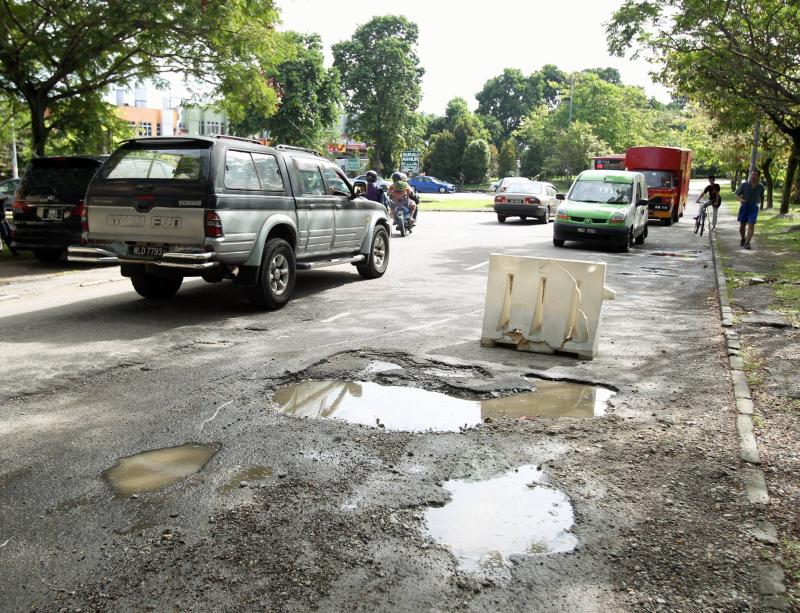Set up a single hotline for potholes, say experts
By BERNAMA | 03 February 2021
KUALA LUMPUR: Fixing pothole-riddled roads has been a never-ending battle, mostly due to the lack of coordination in handling the complaints, according to local experts.
Universiti Teknologi Mara (UiTM) Institute of Infrastructure Engineering and Sustainable Management (IIESM) deputy director Prof Dr Ahmad Kamil Arshad said an integrated hotline system involving all road owners is one of the best ways to coordinate the complaints on damaged roads or potholes so that the problems could be resolved swiftly.
“Those who maintain roads know it is their responsibility, but many road users do not know how to channel their complaints and they will blame only one party, so the expected response to their complaints may be delayed or may not be forthcoming,” he said.
While the Public Works Department (JKR) is in charge of road maintenance, most roads in the country, including municipal roads, are owned by other agencies, such as local authorities, he said.
“I think JKR or highway concessionaires do not have much problem in maintaining roads or highways as they have well-trained personnel and their road surveillance is periodic. But it is not the case for local authorities that do not have a response team to handle and act on complaints quickly.
He urged local authorities to set up such a response team.
Potholes arise as roads age; they are also caused by high traffic density and heavy vehicles.
He called on utility companies to carry out early risk assessment in areas with old pipelines that needed replacement so as to prevent leaking that would damage road surfaces and structures.
“Some potholes are caused by stagnant water that softens the underlying soil and road surface. Although the road paving process may use quality materials, road damage will still occur if other causes are not resolved,” he said.
Sharing his view was Professor in Transport Engineering Datuk Dr Ahmad Farhan Mohd Sadullah of Universiti Sains Malaysia who said that there must be clear-cut road ownership by the various government agencies.
He said the public usually know who is repsonsible for maintaining highways but it is often unclear who maintains secondary roads.
“An integrated hotline complaint system can be used by also displaying road owner information as in the Waze application. By revealing the identity of the road owner, the relevant party is then held accountable,” he said.
In a statement to Bernama, JKR said apart from its "Aku Janji Zero Potholes” campaign, it had also introduced a set of standard operating procedures for utility providers to minimise road damage when they are repairing or replacing damaged structures.
JKR also said that it is working with the Road Transport Department (JPJ) to develop a weigh-in-motion system to record and detect vehicles carrying an excessive load while passing through the measurement location.
“The system can help JKR and JPJ obtain data relating to over-loaded vehicles that can affect the condition of roads under its supervision.”
Regarding the pavement specifications for a road, JKR said it was based on the "Standard Specification For Road Works Section 4: Flexible Pavemen" which is the latest specification and in line with international standards such as AASHTO, Australian Standard and British Standard.
Ikatan Silaturrahim Lando Brotherhood founder Azlan Sani Zawawi urged local authorities to use high-quality cold mix bitumen to repair damaged roads including potholes. His group has been carrying out voluntary road repair works since 2007.
He said the use of pavement material containing high-quality cold mix bitumen was more practical than that of the commonly used hot mix which is time-consuming as it requires heavy machinery to cut the road before it could be cleaned and re-paved.
“However, with the cold mix method, potholes could be fixed quickly just by using hand compactor and it can be cheaper too depending on the extent of the damage.”
Tags
Autos News
Reviews

First drive with the 2025 Hyundai Tuscon and Santa Fe: Seoul...

5.8
Kymco AK550 Premium: Smart easy rider

BYD Seal 6 Premium: Sweet deal, generous kit, sensible prici...

8.7
Mazda CX-80 2.5G PHEV AWD High Plus: Upmarket upgrade

Proton X50 Flagship: Tuned for success

6.6
Triumph Trident 660: Beautifully balanced package

8.4
Mercedes-AMG GLA 35 4Matic: Never a dull moment

Lamborghini Urus SE: Ultimate control
Videos

Free & Easy Media Test: Latest Proton X50 Flagship to Kuanta...

Zeekr Space Sunway City Video

Honda Civic Type R Ultimate Edition: Last 40 Units for Europ...
